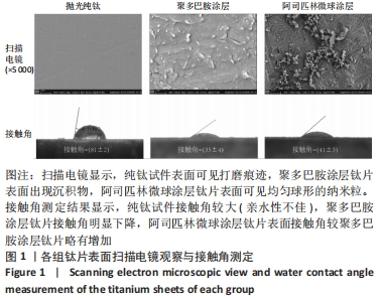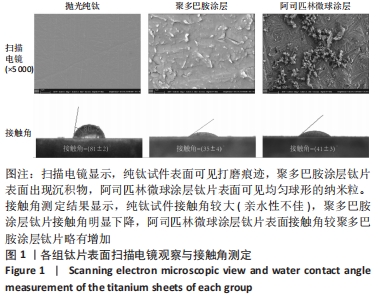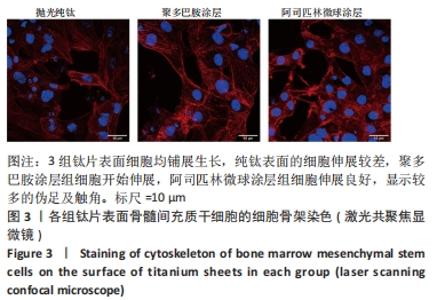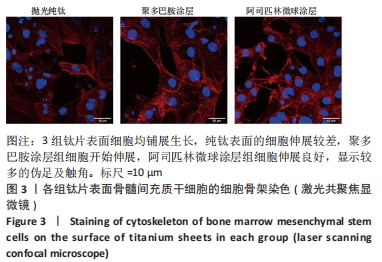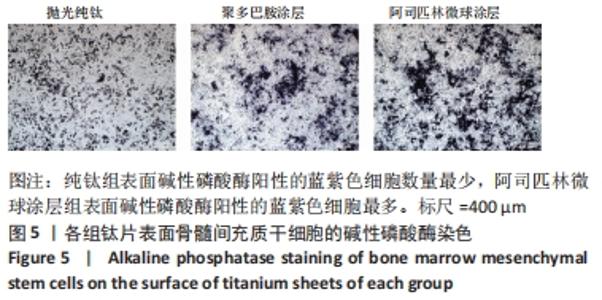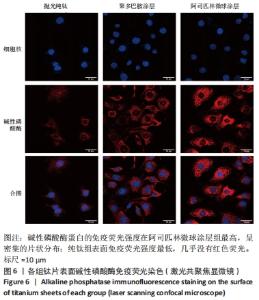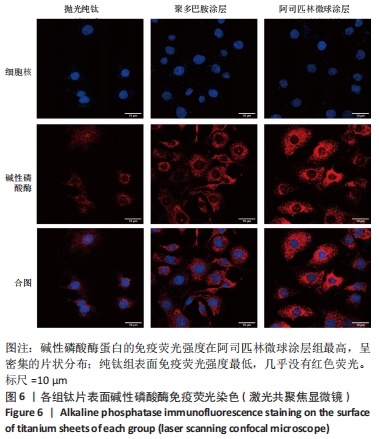Chinese Journal of Tissue Engineering Research ›› 2023, Vol. 27 ›› Issue (3): 374-379.doi: 10.12307/2023.006
Previous Articles Next Articles
Aspirin-loaded chitosan nanoparticles and polydopamine modified titanium sheets improve osteogenic differentiation
Li Rui, Liu Zhen, Guo Zige, Lu Ruijie, Wang Chen
- Hospital of Stomatology, Tianjin Medical University, Tianjin 300070, China
-
Received:2021-10-26Accepted:2021-12-07Online:2023-01-28Published:2022-05-20 -
Contact:Li Rui, MD, Associate professor, Hospital of Stomatology, Tianjin Medical University, Tianjin 300070, China -
About author:Li Rui, MD, Associate professor, Hospital of Stomatology, Tianjin Medical University, Tianjin 300070, China -
Supported by:General Project of Tianjin Natural Science Foundation, No. 18JCYBJC95500 (to LR)
CLC Number:
Cite this article
Li Rui, Liu Zhen, Guo Zige, Lu Ruijie, Wang Chen. Aspirin-loaded chitosan nanoparticles and polydopamine modified titanium sheets improve osteogenic differentiation[J]. Chinese Journal of Tissue Engineering Research, 2023, 27(3): 374-379.
share this article
Add to citation manager EndNote|Reference Manager|ProCite|BibTeX|RefWorks
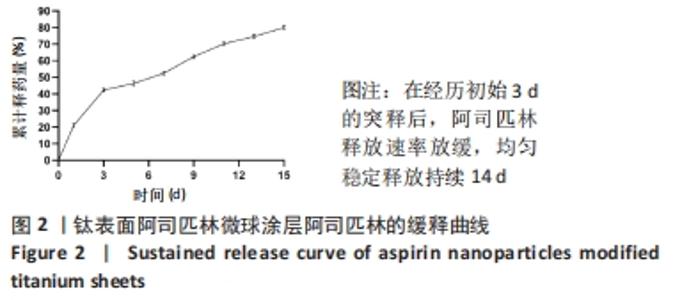
扫描电镜下可见,纯钛表面相对光滑,仅可见抛光留下的细小纹理;经过多巴胺修饰后,钛表面出现沉积物及颗粒状突起,说明多巴胺牢固聚合于纯钛表面;阿司匹林纳米微球固定后,可见纳米微球固定于钛表面,阿司匹林纳米微球呈圆球形,粒径分布均匀。纯钛组接触角为(81±2)°,聚多巴胺涂层组接触角为(35±4)°,阿司匹林微球涂层组接触角为(41±3)°,多巴胺涂层组与阿司匹林微球涂层组的亲水性均明显大于纯钛组(P < 0.05),阿司匹林微球涂层组亲水性略低于多巴胺组(P < 0.05)。 2.2 钛表面阿司匹林微球涂层释药曲线 阿司匹林微球涂层的体外释放曲线结果如图2 所示,涂层在经历前3 d的初期药物突释后,随着释药时间的增长,阿司匹林的释放开始明显减缓;在随后的15 d中仍有阿司匹林从涂层中缓慢释放,累计释放率约为80%。 "
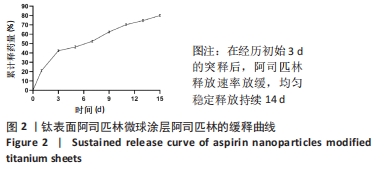
| [1] AHN TK, LEE DH, KIM TS, et al. Modification of Titanium Implant and Titanium Dioxide for Bone Tissue Engineering. Adv Exp Med Biol. 2018; 1077: 355-368. [2] OSHIDA Y, TUNA EB, AKTöREN O, et al. Dental implant systems. Int J Mol Sci. 2010;11(4):1580-1678. [3] CHRCANOVIC BR, ALBREKTSSON T, WENNERBERG A. Reasons for failures of oral implants. J Oral Rehabil. 2014;41(6):443-476. [4] KIM TI, JANG JH, KIM HW, et al. Biomimetic approach to dental implants. Curr Pharm Des. 2008;14(22):2201-2211. [5] HE Y, MU C, SHEN X, et al. Peptide LL-37 coating on micro-structured titanium implants to facilitate bone formation in vivo via mesenchymal stem cell recruitment. Acta Biomater. 2018;80:412-424. [6] LE GUéHENNEC L, SOUEIDAN A, LAYROLLE P, et al. Surface treatments of titanium dental implants for rapid osseointegration. Dent Mater. 2007;23(7):844-854. [7] CHIEN CY, LIU TY, KUO WH, et al. Dopamine-assisted immobilization of hydroxyapatite nanoparticles and RGD peptides to improve the osteoconductivity of titanium. J Biomed Mater Res A. 2013;101(3): 740-747. [8] MAIER GP, RAPP MV, WAITE JH, et al. BIOLOGICAL ADHESIVES. Adaptive synergy between catechol and lysine promotes wet adhesion by surface salt displacement. Science. 2015;349(6248): 628-632. [9] GUO Q, CHEN J, WANG J, et al. Recent progress in synthesis and application of mussel-inspired adhesives. Nanoscale. 2020;12(3): 1307-1324. [10] FUSTER V, SWEENY JM. Aspirin: a historical and contemporary therapeutic overview. Circulation. 2011;123(7):768-778. [11] CHIN KY. A Review on the Relationship between Aspirin and Bone Health. J Osteoporos. 2017;2017:3710959. [12] DU J, MEI S, GUO L, et al. Platelet-rich fibrin/aspirin complex promotes alveolar bone regeneration in periodontal defect in rats. J Periodontal Res. 2018;53(1):47-56. [13] DU M, PAN W, DUAN X, et al. Lower dosage of aspirin promotes cell growth and osteogenic differentiation in murine bone marrow stromal cells. J Dent Sci. 2016;11(3):315-322. [14] PAñOS I, ACOSTA N, HERAS A. New drug delivery systems based on chitosan. Curr Drug Discov Technol. 2008;5(4):333-341. [15] RAJITHA P, GOPINATH D, BISWAS R, et al. Chitosan nanoparticles in drug therapy of infectious and inflammatory diseases. Expert Opin Drug Deliv. 2016;13(8):1177-1194. [16] PAN C, QIAN J, ZHAO C, et al. Study on the relationship between crosslinking degree and properties of TPP crosslinked chitosan nanoparticles. Carbohydr Polym. 2020;241:116349. [17] SPRIANO S, YAMAGUCHI S, BAINO F, et al. A critical review of multifunctional titanium surfaces: New frontiers for improving osseointegration and host response, avoiding bacteria contamination. Acta Biomater. 2018;79:1-22. [18] BANDYOPADHYAY A, SHIVARAM A, MITRA I, et al. Electrically polarized TiO(2) nanotubes on Ti implants to enhance early-stage osseointegration. Acta Biomater. 2019;96:686-693. [19] NOZAKI K, WANG W, HORIUCHI N, et al. Enhanced osteoconductivity of titanium implant by polarization-induced surface charges. J Biomed Mater Res A. 2014;102(9):3077-3086. [20] ZHAO QM, SUN YY, WU CS, et al. Enhanced osteogenic activity and antibacterial ability of manganese-titanium dioxide microporous coating on titanium surfaces. Nanotoxicology. 2020;14(3):289-309. [21] SOUZA JCM, SORDI MB, KANAZAWA M, et al. Nano-scale modification of titanium implant surfaces to enhance osseointegration. Acta Biomater. 2019;94:112-131. [22] TSAI WB, CHEN WT, CHIEN HW, et al. Poly(dopamine) coating to biodegradable polymers for bone tissue engineering. J Biomater Appl. 2014;28(6):837-848. [23] SAMYN P. A platform for functionalization of cellulose, chitin/chitosan, alginate with polydopamine: A review on fundamentals and technical applications. Int J Biol Macromol. 2021;178:71-93. [24] JIA L, HAN F, WANG H, et al. Polydopamine-assisted surface modification for orthopaedic implants. J Orthop Translat. 2019;17:82-95. [25] HAZEKAWA M, KOJIMA H, HARAGUCHI T, et al. Effect of Self-healing Encapsulation on the Initial Burst Release from PLGA Microspheres Containing a Long-Acting Prostacyclin Agonist, ONO-1301. Chem Pharm Bull (Tokyo). 2017;65(7):653-659. [26] HULBERT SF, YOUNG FA, MATHEWS RS, et al. Potential of ceramic materials as permanently implantable skeletal prostheses. J Biomed Mater Res. 1970;4(3):433-456. [27] DOU X, WEI X, LIU G, et al. Effect of porous tantalum on promoting the osteogenic differentiation of bone marrow mesenchymal stem cells in vitro through the MAPK/ERK signal pathway. J Orthop Translat. 2019;19:81-93. [28] WANG X, SCHRöDER HC, MüLLER WE. Enzymatically synthesized inorganic polymers as morphogenetically active bone scaffolds: application in regenerative medicine. Int Rev Cell Mol Biol. 2014;313: 27-77. [29] MAEDA K, KOBAYASHI Y, KOIDE M, et al. The Regulation of Bone Metabolism and Disorders by Wnt Signaling. Int J Mol Sci. 2019;20(22): 5525. [30] ZHAO C, LI Y, WANG X, et al. The Effect of Uniaxial Mechanical Stretch on Wnt/β-Catenin Pathway in Bone Mesenchymal Stem Cells. J Craniofac Surg. 2017;28(1):113-117. [31] SHEN G, REN H, SHANG Q, et al. Foxf1 knockdown promotes BMSC osteogenesis in part by activating the Wnt/β-catenin signalling pathway and prevents ovariectomy-induced bone loss. EBioMedicine. 2020;52: 102626. [32] YAMAZA T, MIURA Y, BI Y, et al. Pharmacologic stem cell based intervention as a new approach to osteoporosis treatment in rodents. PLoS One. 2008;3(7):e2615. [33] LI Y, BAI Y, PAN J, et al. A hybrid 3D-printed aspirin-laden liposome composite scaffold for bone tissue engineering. J Mater Chem B. 2019; 7(4):619-629. |
| [1] | Li Zhifei, Yang Yin, Chen Hualong, Liang Qinqiu, Zhong Yuanming, Zhang Yisheng. Finite element analysis of the correlation between tilt angle of titanium cage and postoperative subsidence of titanium cage after anterior subtotal cervical corpectomy, decompression and fusion [J]. Chinese Journal of Tissue Engineering Research, 2024, 28(9): 1313-1319. |
| [2] | Wang Wen, Zheng Pengpeng, Meng Haohao, Liu Hao, Yuan Changyong. Overexpression of Sema3A promotes osteogenic differentiation of dental pulp stem cells and MC3T3-E1 [J]. Chinese Journal of Tissue Engineering Research, 2024, 28(7): 993-999. |
| [3] | Wang Shanshan, Shu Qing, Tian Jun. Physical factors promote osteogenic differentiation of stem cells [J]. Chinese Journal of Tissue Engineering Research, 2024, 28(7): 1083-1090. |
| [4] | Yin Kaiwen, Li Yunfeng. Application of metal-organic frameworks in implant surface modification [J]. Chinese Journal of Tissue Engineering Research, 2024, 28(5): 783-788. |
| [5] | Cheng Jinhui, Wu Quan, Peng Min, Huang Changli, Tian Huimin, Li Yang. Preparation and properties of selective laser melting of porous titanium at a low energy density [J]. Chinese Journal of Tissue Engineering Research, 2024, 28(5): 664-668. |
| [6] | Wang Wenchi, Wu Ruiqi, Huang Jierong, Zhu Lifeng, Cui Xianqin, Li Dongzong, Chen Wenhui, Lin Chunting, Cui wei. Molecular mechanism of naringin in prevention and treatment of osteoporosis [J]. Chinese Journal of Tissue Engineering Research, 2024, 28(34): 5528-5535. |
| [7] | Ren Hangling, Song Na, Xu Daxia, Li Zonghuan, Zhang Zhi, Zhang Jingtao. Effect of different fusion devices on cervical sagittal parameters after anterior cervical discectomy and fusion for cervical spondylotic myelopathy [J]. Chinese Journal of Tissue Engineering Research, 2024, 28(33): 5375-5382. |
| [8] | Shi Xian, Han Chunqing, Hu Anran, Kuang Shuyun, Ran Yimeng, Wu Yu. Atf7ip is a negative regulator of bone morphogenetic protein 2 promoting osteogenic differentiation in mouse embryonic adult cells [J]. Chinese Journal of Tissue Engineering Research, 2024, 28(31): 4931-4936. |
| [9] | Lin Zhanying, Lin Ziyun, Huang Liuyan, Zhang Wenxi, Zuo Changqing. Overexpression of long non-coding RNA Gm16104 affects osteogenic differentiation of C3H10T1/2 mesenchymal stem cells [J]. Chinese Journal of Tissue Engineering Research, 2024, 28(31): 4964-4969. |
| [10] | Shen Yurong, Nai Rentong, Zhao Ling, Liu Feigang, Yin Caoyang, Gu Yuanping, Chen Tieyi. Influence of NIC X-FILE and DENCO Pre-Shaper nickel-titanium instruments on the shaping of simulated curved canals [J]. Chinese Journal of Tissue Engineering Research, 2024, 28(3): 387-391. |
| [11] | Zhu Zhiqi, Yuan Sijie, Zhang Zilin, Ji Shijie, Meng Mingsong, Yan Anming, Han Jing. Mechanism underlying the effect of Liuwei Dihuang Pill on osteolysis and osteogenesis induced by titanium particles [J]. Chinese Journal of Tissue Engineering Research, 2024, 28(3): 392-397. |
| [12] | Liao Shuaixiong, Deng Kai, Bai Nan, Yang Wenliang, Wang Feng, Hao Zongji, Li Xueying. Mechanism by which exercise improves inhibitory control and drug craving in methamphetamine abstinent patients [J]. Chinese Journal of Tissue Engineering Research, 2024, 28(27): 4390-4396. |
| [13] | Zhang Jie, Xiao Tianjiao, Li Li, Kang Jiabing, Zhan Jifan, Wei Yan, Tian Ai. Interleukin-4 regulates macrophage polarization and osteogenic differentiation of bone marrow mesenchymal stem cells [J]. Chinese Journal of Tissue Engineering Research, 2024, 28(25): 3960-3966. |
| [14] | Han Yue, Wang Yufei, Liu Wanqing, Dong Ming, Niu Weidong. Effects of icariin on proliferation and differentiation of MC3T3-E1 cells in an inflammatory environment [J]. Chinese Journal of Tissue Engineering Research, 2024, 28(23): 3709-3714. |
| [15] | Chu Fuchao, Wang Zhenxin, Zhang Dazhen, Yuan Feng. Osteogenic properties of polyacrylamide-modified gelatin methacryloyl grafted titanium alloy scaffold [J]. Chinese Journal of Tissue Engineering Research, 2024, 28(22): 3472-3477. |
| Viewed | ||||||
|
Full text |
|
|||||
|
Abstract |
|
|||||
